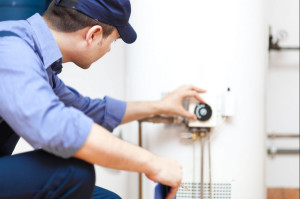Protect Your Home From Pricey Winter Problems

Consider installing a device that will shut off your water supply if it detects an unusually high water flow which would indicate a burst pipe.
Winter seems to be in full force and with it comes winter related damage that can affect your home. According to the Insurance Information Institute, winter related damage is the third-largest cause of property loss. Unfortunately, some of it may not be covered by your homeowners policy.
Making yourself aware of the potential pitfalls that winter brings is half the battle. Here are just a few things you should watch out for as temperatures drop and the snow starts to fly.
Inside your Walls
Frozen pipes tend to burst and that can lead to very expensive water damage. If you happen to be out of town at the time, the damage can quickly escalate to a very high dollar claim. Pipes in an outside wall, attics and basements are high-risk pipes that tend to freeze easily.
One way to help prevent frozen pipes is to add insulation to the pipes and open cabinet doors to allow warmer air in if you are going to be away for awhile. Never turn the thermostat lower than 60 degrees when leaving on vacation. The money you may save on your heating bill will quickly be eaten up when your pipes burst and flood your home.
If your house sits empty over the cold winter while you sun yourself in Florida consider installing a device that will shut off your water supply if it detects an unusually high water flow which would indicate a burst pipe. While these devices can be expensive, ranging from $400 all the way up to $3,000, they could result in a discount on your insurance premium. At the very least, make sure one of your neighbors has access to your home and checks in periodically.
On Your Roof
Ice dams can cause extensive damage inside your walls and the damage may be severe before you even notice it. An ice dam forms when the heat generated by the house causes snow and ice to melt on the top and middle of your roof and then it refreezes near the gutters and pushes back on the shingles.
When the ice melts behind the dam, the water pools and it ends up inside your walls, which not only damages the sheet rock but can also result in electrical issues. Keeping your attic and roof cold will help prevent the development of ice dams. Add insulation to keep the heat inside your home where it belongs.
In Your Basement
Water that flows into your basement from the outside due to melting snow or ice is consider flood damage and is not covered by your homeowners insurance. If you live in an area where this is a possibility your may want to consider buying a separate flood policy. This type of coverage can be expensive. Consider installing a sump pump which can help prevent extensive damage by moving the water out quickly.
Outside Dangers
Ice is heavy and an ice covered branch falling on your home or car can cause extensive damage. While your insurance will certainly cover this type of damage, many policies only offer up to $500 for removal of the branch or tree. This may not be enough in some cases.
Experts advise trimming back any branches that could fall on your home if they were to fall. Using a professional is highly recommended, as trimming a tree can be dangerous work.
As the weather turns cold, disconnect outside hoses. If water freezes up in a hose it works its way back into the pipe, often causing it to burst. When you turn the faucet on in the spring you could end up with a flooded basement.
More Winter Tips & Resource
If you have additional questions about your home during the winter season, please check out our recent FAQ’s:
